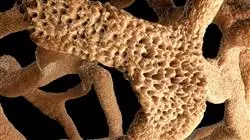University certificate
The world's largest faculty of medicine”
Introduction to the Program
A specific program in the management of non-inflammatory pediatric musculoskeletal diseases that will give you the keys to an innovative and global intervention"

Childhood is not a territory safe from rheumatologic disease (RD). Although it is difficult to know their exact prevalence, given the absence of specific and global studies, they are potentially serious diseases that lead to a significant decrease in the quality of life of the affected child. Comprehensive care for patients and their families as a fundamental part of the process, is an essential condition in the approach to this group of diseases.
This Postgraduate diploma offers a different look at the global care that the child affected by RD needs. A comprehensive approach that covers all aspects of this care: from pre- and post-diagnostic care to families, pharmacological criteria and psychological and emotional care for the affected person and their environment. A holistic approach that you will acquire throughout the most specific and comprehensive online program in the teaching market.
During this comprehensive program, professionals will have the opportunity to acquire the basic knowledge necessary to deal with the situations that arise around a child or adolescent suspected of having RMD. From the moment of diagnosis, with the development of the guidelines that the specialist must follow to the information on procedures or attitudes to be avoided in this medical practice.
This Postgraduate diploma will also offer them a different view of what RD means thanks to the participation of expert patients; an unparalleled opportunity to complete the medical knowledge with the view from the other side. This approach seeks to respond to the need for general practitioners, orthopedic surgeons, pediatricians, rheumatologists, social workers, nurses, psychologists and many other professionals to be able to handle situations with a high impact on the lives of children and young people and their families.
All aspects of the practice of Pediatric Rheumatology, with a global vision of the care of the affected patient, in the most complete Postgraduate diploma on the online teaching market"
This Postgraduate diploma in Management of Pediatric Non-Inflammatory Musculoskeletal Diseases contains the most complete and up-to-date scientific program on the market. The most important features include:
- The latest technology in online teaching software
- A highly visual teaching system, supported by graphic and schematic contents that are easy to assimilate and understand
- Practical cases presented by practising experts
- State-of-the-art interactive video systems
- Teaching supported by telepractice
- Continuous updating and recycling systems
- Autonomous learning: full compatibility with other occupations
- Practical exercises for self-evaluation and learning verification
- Support groups and educational synergies: questions to the expert, debate and knowledge forums
- Communication with the teacher and individual reflection work
- Content that is accessible from any fixed or portable device with an Internet connection
- Supplementary documentation databases are permanently available, even after the program
The teachers of this Postgraduate diploma have been selected on the basis of two fundamental criteria: their proven experience and knowledge of RD in pediatrics and their proven teaching skills"
The program’s teaching staff includes professionals from the sector who contribute their work experience to this educational program, as well as renowned specialists from leading societies and prestigious universities.
The multimedia content, developed with the latest educational technology, will provide the professional with situated and contextual learning, i.e., a simulated environment that will provide immersive education programmed to learn in real situations.
This program is designed around Problem-Based Learning, whereby the professional must try to solve the different professional practice situations that arise during the academic year. For this purpose, the professional will be assisted by an innovative interactive video system created by renowned and experienced experts.
With a methodological design based on proven teaching techniques, this Postgraduate diploma will take you through different teaching approaches to allow you to learn in a dynamic and effective way"

Our innovative telepractice concept will give you the opportunity to learn through an immersive experience, which means a faster assimilation and a much more realistic view of the contents: “learning from an expert”
Why study at TECH?
TECH is the world’s largest online university. With an impressive catalog of more than 14,000 university programs available in 11 languages, it is positioned as a leader in employability, with a 99% job placement rate. In addition, it relies on an enormous faculty of more than 6,000 professors of the highest international renown.

Study at the world's largest online university and guarantee your professional success. The future starts at TECH”
The world’s best online university according to FORBES
The prestigious Forbes magazine, specialized in business and finance, has highlighted TECH as “the world's best online university” This is what they have recently stated in an article in their digital edition in which they echo the success story of this institution, “thanks to the academic offer it provides, the selection of its teaching staff, and an innovative learning method aimed at educating the professionals of the future”
A revolutionary study method, a cutting-edge faculty and a practical focus: the key to TECH's success.
The most complete study plans on the university scene
TECH offers the most complete study plans on the university scene, with syllabuses that cover fundamental concepts and, at the same time, the main scientific advances in their specific scientific areas. In addition, these programs are continuously being updated to guarantee students the academic vanguard and the most in-demand professional skills. In this way, the university's qualifications provide its graduates with a significant advantage to propel their careers to success.
TECH offers the most comprehensive and intensive study plans on the current university scene.
A world-class teaching staff
TECH's teaching staff is made up of more than 6,000 professors with the highest international recognition. Professors, researchers and top executives of multinational companies, including Isaiah Covington, performance coach of the Boston Celtics; Magda Romanska, principal investigator at Harvard MetaLAB; Ignacio Wistumba, chairman of the department of translational molecular pathology at MD Anderson Cancer Center; and D.W. Pine, creative director of TIME magazine, among others.
Internationally renowned experts, specialized in different branches of Health, Technology, Communication and Business, form part of the TECH faculty.
A unique learning method
TECH is the first university to use Relearning in all its programs. It is the best online learning methodology, accredited with international teaching quality certifications, provided by prestigious educational agencies. In addition, this disruptive educational model is complemented with the “Case Method”, thereby setting up a unique online teaching strategy. Innovative teaching resources are also implemented, including detailed videos, infographics and interactive summaries.
TECH combines Relearning and the Case Method in all its university programs to guarantee excellent theoretical and practical learning, studying whenever and wherever you want.
The world's largest online university
TECH is the world’s largest online university. We are the largest educational institution, with the best and widest online educational catalog, one hundred percent online and covering the vast majority of areas of knowledge. We offer a large selection of our own degrees and accredited online undergraduate and postgraduate degrees. In total, more than 14,000 university degrees, in eleven different languages, make us the largest educational largest in the world.
TECH has the world's most extensive catalog of academic and official programs, available in more than 11 languages.
Google Premier Partner
The American technology giant has awarded TECH the Google Google Premier Partner badge. This award, which is only available to 3% of the world's companies, highlights the efficient, flexible and tailored experience that this university provides to students. The recognition as a Google Premier Partner not only accredits the maximum rigor, performance and investment in TECH's digital infrastructures, but also places this university as one of the world's leading technology companies.
Google has positioned TECH in the top 3% of the world's most important technology companies by awarding it its Google Premier Partner badge.
The official online university of the NBA
TECH is the official online university of the NBA. Thanks to our agreement with the biggest league in basketball, we offer our students exclusive university programs, as well as a wide variety of educational resources focused on the business of the league and other areas of the sports industry. Each program is made up of a uniquely designed syllabus and features exceptional guest hosts: professionals with a distinguished sports background who will offer their expertise on the most relevant topics.
TECH has been selected by the NBA, the world's top basketball league, as its official online university.
The top-rated university by its students
Students have positioned TECH as the world's top-rated university on the main review websites, with a highest rating of 4.9 out of 5, obtained from more than 1,000 reviews. These results consolidate TECH as the benchmark university institution at an international level, reflecting the excellence and positive impact of its educational model.” reflecting the excellence and positive impact of its educational model.”
TECH is the world’s top-rated university by its students.
Leaders in employability
TECH has managed to become the leading university in employability. 99% of its students obtain jobs in the academic field they have studied, within one year of completing any of the university's programs. A similar number achieve immediate career enhancement. All this thanks to a study methodology that bases its effectiveness on the acquisition of practical skills, which are absolutely necessary for professional development.
99% of TECH graduates find a job within a year of completing their studies.
Postgraduate Diploma in Management of Non-inflammatory Pediatric Musculoskeletal Diseases
The correct management of non-inflammatory pediatric musculoskeletal diseases is essential to ensure the well-being of children. These pathologies can cause pain, mobility limitations and even deformities in children, and it is necessary to have experts who know how to treat them effectively.The Postgraduate Diploma in Management of Pediatric Non-Inflammatory Musculoskeletal Diseases is a specialization designed to prepare professionals trained in the diagnosis and treatment of these pathologies. This program offers an innovative approach that focuses on the specific problems that may occur in each case, rather than focusing directly on the disease. The program is designed to provide the student with the necessary tools to carry out a comprehensive and multidisciplinary management of these pathologies. The teaching team is made up of experts in the field, who will share their knowledge and experience to help students acquire the skills necessary for success in their profession.
The latest advances in pediatric treatments
The program includes the latest advances in diagnosis and treatment of non-inflammatory pediatric musculoskeletal diseases, as well as the application of advanced techniques and therapies to ensure patient improvement. Students will learn to carry out an accurate assessment and effective therapeutic approach, and to work as a team to ensure a comprehensive approach in the treatment of these pathologies.In short, the Postgraduate Diploma in Management of Pediatric Non-Inflammatory Musculoskeletal Diseases is a quality specialization that provides the student with the skills and knowledge necessary to provide patients with quality care. A highly valued specialization in the health sector, which opens the doors to new professional opportunities.







